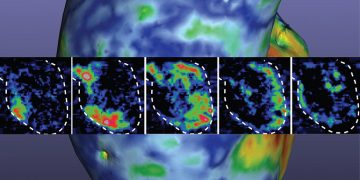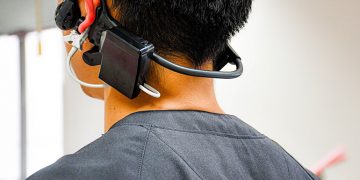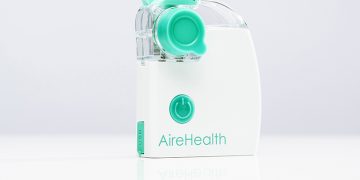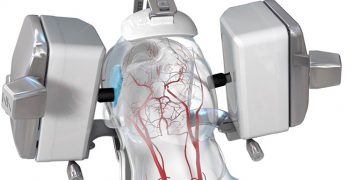
Editor’s Note: Every Wednesday, James Hamblin takes questions from readers about health-related curiosities, concerns, and obsessions. Have one? Email him at paging.dr.hamblin@theatlantic.com.
Dear Dr. Hamblin,
As an Atlantic reporter covering the White House, I’ll soon be traveling to cover things like Trump rallies. Am I at any risk of contracting the virus if I stay at a hotel? Could the virus be passed through the hotel’s HVAC system?
Peter Nicholas
Washington, D.C.
The last thing anyone wants to do after a long day of vigilant mask wearing is worry that, even alone in the solace of your room in some Comfort Inn, it’s not safe to take off your mask. But although building ventilation hasn’t gotten a lot of attention during this pandemic, it could pose problems.
Unlike when you open a window and allow air to pass through, air-conditioning recirculates a lot of the same air inside a building. Though the exact risks are still unknown, this has the potential to create a virus-laden stew in offices and, yes, hotels. Earlier this month, two researchers from Harvard Medical School argued in JAMA that, beyond washing hands and wearing masks, “air disinfection” has been a largely missing element of the strategy to prevent coronavirus transmission. The issue could be especially important as we head into summer: Hotter temperatures will drive people indoors just as many places are reopening and we’re supposed to go about our “normal life.”
The airborne spread of the coronavirus has been well documented. Famously, outbreaks have emerged from choir practices and other indoor gatherings, with infection rates so uniquely high that it’s unlikely everyone got infected by touching the same surface. Over a long period in an enclosed space, it seems, singing can spew virus into the air until it accumulates to the point of danger for people who are well over six feet away.
Once a virus is hanging in the air—and we know that the coronavirus can linger for hours—it will travel with air currents. One ominous study of a restaurant in Guangzhou, China, documented how air-conditioning appeared to spread the virus between tables at opposite sides of the room. The issue wasn’t that the virus was traveling through the air-conditioning unit, but that it was getting pushed around the room by the stream of air. The takeaway is that while airflow is good when it’s coming from open windows, it could make things worse when it’s coming from an AC unit that’s blowing air around a closed room. Coughing in a well-ventilated room is sort of like peeing in a river as opposed to a hot tub: Ideally you wouldn’t do either, but one is definitely worse.
[Read: The moral history of air-conditioning]
There’s currently no clear evidence of this virus spreading from room to room through air-conditioning, as you’re curious about, Peter. I’d be more concerned about the air at the rallies themselves. But the presumption is that it could, and buildings should take precautions to prevent that possibility.
“In a high-functioning building with a well-conditioned HVAC, you shouldn’t expect that there would be spread between different rooms,” Krystal Pollitt, an epidemiologist at the Yale School of Public Health, told me. But that’s only if things are up to code and working properly.
For example, commercial building codes in many places require “negative-pressure ventilation” in bathrooms—meaning air is propelled outside by an exhaust fan. This is especially important during the pandemic because of something called “toilet plume,” which I wish I’d never read about. Basically, when you flush a toilet with the lid up, the rush of water can aerosolize the contents of the bowl and send some of them up into the air, kind of like an enormous cough. During the SARS coronavirus outbreak, in 2003, a cluster of cases in Hong Kong was attributed to one person with diarrhea in a poorly ventilated apartment building.
In light of the pandemic, various professional organizations have issued new recommendations for building ventilation, but how widely they’ll be followed is unclear. The fixes aren’t actually groundbreaking: They’re mostly things that everyone was supposed to be doing all along, such as ensuring that bathrooms have exhaust fans and that air filters are changed regularly and of high-enough quality to catch the virus. That means they should be high-efficiency particulate air (HEPA) filters or MERV-rated 13 or 14, which are essentially the N-95 masks of air filters.
[Read: A Frightening New Reason to Worry About Air Pollution]
Hotels, offices, restaurants, and commercial venues of all sorts could also augment their HVAC systems with localized air purifiers. They’re incredibly effective at removing viral material from the air, and could be a useful tool when people have to share rooms. I could see them being placed between desks in an office or tables in a restaurant.
But these are just recommendations, not legally mandated standards. Sometimes recommendations are adopted by cities as building codes, and sometimes they aren’t. “These new recommendations haven’t been looked at widely,” Pollitt told me. “I don’t think they’re going to widely be in place.” And even if new codes are adopted, businesses won’t be expected to meet them overnight. Nor are cities equipped to inspect and enforce them assiduously.
Without more stringent government protections, the best you can do while traveling is look for third-party certifications such as LEED or WELL. Buildings that have gone through those certification processes are guaranteed to have ventilation systems that go well beyond the typical standards.
As you can tell, this is a problem that isn’t going to be fixed by you or me: It’s going to require investment by businesses and governments. On top of all the anxieties of pandemic life, no one should have to worry about the air filters in their hotel room or workplace. With proper regulations and enforcement, ideally we could just assume that the systems are properly maintained wherever we go. That’s not the case now in many places, and the issue goes well beyond this pandemic: More than 1 million people die globally every year from exposure to indoor air pollution. All sorts of health benefits come from the exact upgrades that would help contain the spread of the coronavirus. Now would be a perfect time to set in motion a new standard for clean air.
Related Podcast
Listen to James Hamblin talk about this story on Social Distance, The Atlantic’s podcast about life in the pandemic:
Subscribe to Social Distance on Apple Podcasts or Spotify (How to Listen)
“Paging Dr. Hamblin” is for informational purposes only, does not constitute medical advice, and is not a substitute for professional medical advice, diagnosis, or treatment. Always seek the advice of your physician or other qualified health provider with any questions you may have regarding a medical condition. By submitting a letter, you are agreeing to let The Atlantic use it—in part or in full—and we may edit it for length and/or clarity.














